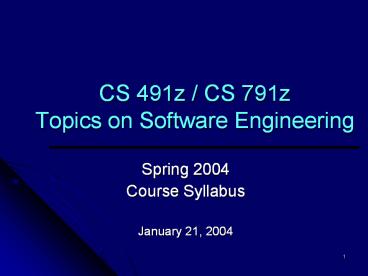CS 491z / CS 791z Topics on Software Engineering - PowerPoint PPT Presentation
Title:
CS 491z / CS 791z Topics on Software Engineering
Description:
PhD, Dalhousie U., Halifax, NS, Canada, 2001. Teaching and ... Additional material (papers, tutorials, etc.) that will be indicated later by the instructor ... – PowerPoint PPT presentation
Number of Views:33
Avg rating:3.0/5.0
Title: CS 491z / CS 791z Topics on Software Engineering
1
CS 491z / CS 791zTopics on Software Engineering
- Spring 2004
- Course Syllabus
- January 21, 2004
2
Outline
- The Instructor
- The Students
- The Course
- The Texts Initial WWW Pointers
- Grading Scheme Grading Scale
- Policies
- Summary of Course Objectives
- A Look Ahead
3
The Instructor.
- Sergiu Dascalu
- Room SEM-236
- Telephone 784-4613
- E-mail dascalus_at_cs.unr.edu
- Web-site www.cs.unr.edu/dascalus
- Office hours
- Tuesday and Wednesday 400 500 pm or by
appointment or chance
4
.The Instructor
- Sergiu Dascalu
- PhD, Dalhousie U., Halifax, NS, Canada, 2001
- Teaching and research at UNR since July 2002
- Teaching and research at Dalhousie University,
1993-2001 (software engineering focus) - Teaching and research at the University
Politehnica Bucharest, Romania, 1984-1993 (RTS
focus) - Consultant for software development companies in
Canada and Romania
5
The Students
- Registered as of today
- 10 graduate 4 undergraduate
- Prerequisite
- CS 425 Software Engineering or Instructors
approval
6
The Course.
- Classroom
- SEM-261, MW 530 - 645 pm
- Outline The objective of this course is to
explore advanced topics on software engineering,
in particular on developing software for reactive
and real-time systems. Topics covered encompass
characteristics of real-time systems (including
mission-critical and safety-critical systems),
software life-cycles, methods and tools for
software analysis and specification, design,
implementation and testing, software
documentation, performance engineering, UML-based
modeling, and case studies.
7
.The Course
- Outline continued
- The course is intended to allow the students to
broaden their knowledge of software engineering
concepts, principles, techniques and tools, study
relevant research publications in the field,
prepare and present a high quality software
engineering project and, based on this project,
write a paper that could be submitted to a
scientific conference.
8
The Texts.
- Required textbook
- Cooling03 Jim Cooling, Software Engineering
for Real-Time Systems, Addison-Wesley, 2003. - ISBN 0-201-59620-2
- Recommended textbooks
- Shaw01 Alan C. Shaw, Real-Time Systems and
Software, John Wiley Sons, 2001. - ISBN 0-471-35490-2
- Arlow02 Jim Arlow and Ila Neustadt, UML and
the Unified Process Practical Object-Oriented
Analysis and Design, Addison Wesley, 2002. - ISBN 0-201-77060-1
9
.The Texts
- Lecture notes
- Presentations by the instructor
- Notes you take in the classroom
- Additional material (papers, tutorials, etc.)
that will be indicated later by the instructor
10
Initial WWW Pointers
- IEEEs Digital Library, via www.ieee.org
- ACM Digital Library, via www.acm.org
- The Software Engineering Institute, at Carnegie
Mellon University, www.sei.cmu.edu - IEEE Computer Societys Technical Council on
Software Engineering, www.tcse.org - The Object Management Group, www.omg.com
- IBM / Rational Software, www.rational.com
- More will be indicated later
11
Grading Scheme..
- Grading Scheme for CS 791z students (tentative)
- Assignments (assigned reading) 15
- Presentations 12
- Midterm test 20
- Project 32
- Paper 14
- Class participation 7
- TOTAL 100
12
.Grading Scheme.
- Grading Scheme for CS 491z students (tentative)
- Assignments (assigned reading) 20
- Presentations 10
- Midterm test 20
- Project 40
- Class participation 10
- TOTAL 100
13
..Grading Scheme
- Passing conditions (all must be met)
- 50 overall
- 50 in test
- 50 in project and paper
- 50 in assignments, presentations, and class
participation - For grade A at least 90 overall, at least 85
in class participation and at least 60 in test - Note that there are no make-up tests or homework
in this course
14
Grading Scale
- Numerical-letter grade correspondence
- A 91 -100
- A- 87 - 90
- B 84 - 86
- B 79 - 83
- B- 75 - 78
- C 72 - 74
- C 68 - 71
- C- 64 - 67
- D 60 - 63
- D 55 - 59
- D- 50 - 54
- F lt 50
15
Policies..
- Late submission policy
- Maximum 2 late days per assignment/project
deliverable - Each late day penalized with 10
- No subdivision of late days (e.g. in hours)
- No late days for presentations and test
- Example a 90/100 worth assignment gets 81/100 if
one day late (900.9 81) or 72/100 if two days
late (900.8 72)
16
.Policies.
- Legal notices on the world-wide web Read and
comply with accompanying legal notices of
downloadable material - Specify references used
- Do not plagiarize (see next slide)
17
..Policies
- Plagiarism and cheating will not be tolerated.
Please read the policies of University of Nevada,
Reno regarding academic dishonesty - www.unr.edu/stsv/acdispol.html
18
Summary of Course Objectives
- Course objectives
- Extension of software engineering (SE) knowledge,
in particular of SE for Real-Time Systems (RTS) - Study and presentation of relevant research
publications - Development of a high quality software project
- Overall improvement of research skills
- For CS 791z students writing a paper that can be
submitted to a scientific conference
19
A Look Ahead.
- My intentions expectations
- Provide guidance in the complex SE spectrum
- Help you be better prepared for research and
development in SE - Guide you in writing an SE research paper
- Hope that you will both work hard and enjoy your
work in this course
20
.A Look Ahead
- Your intentions expectations
- Why do you take the course?
- What is your experience so far with SE? With RTS?
- In what ways do you think this course could help
your professional development? - What topics are you interested in?
- What suggestions do you have for the instructor?
- Are you ready for the ride?































